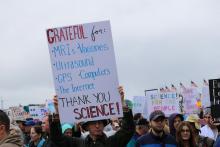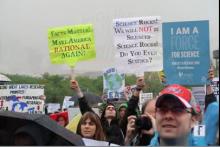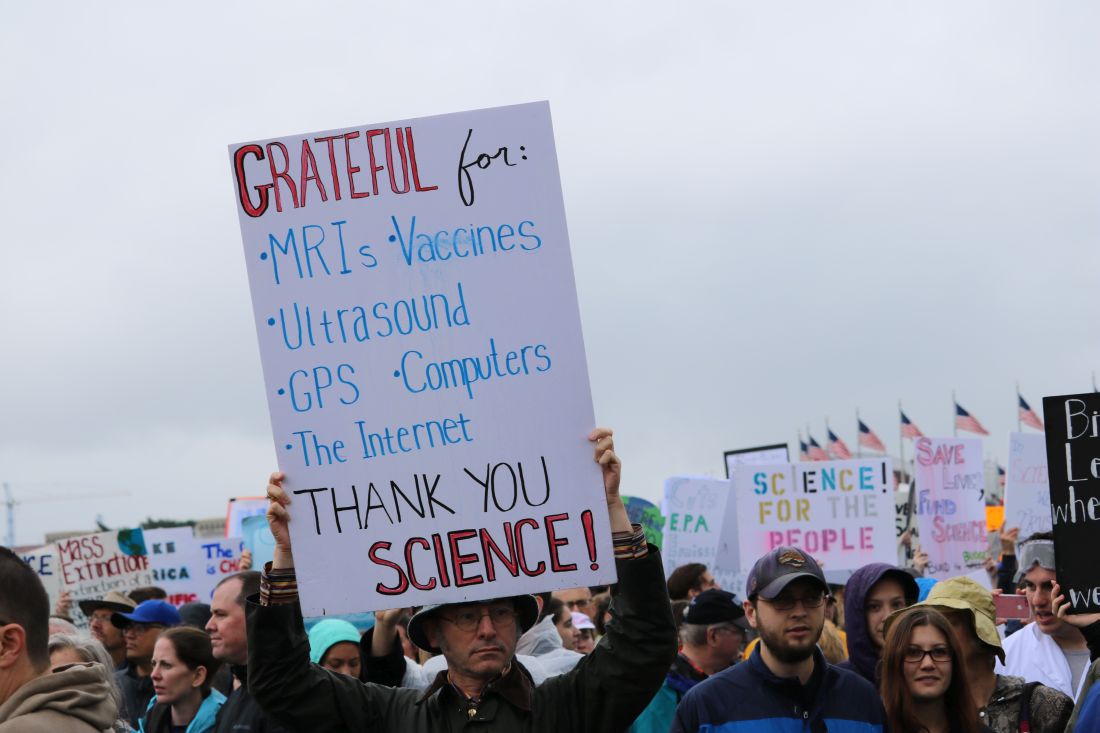User login
WASHINGTON – Crowds of protesters packed the Washington’s National Mall for the March for Science, joining participants in 600 cities across the world on Saturday, April 22.
Advocates came in droves, braving the rain armed with homemade signs, chants, and a passion for peer review, to champion the scientific method and the importance of its role in society and policy making.
The event, organized by March for Science, Earth Day Network, and a robust list of advocacy groups and think tanks, started with learning sessions hosted in tents located beyond the Washington Monument, where experts in topics from physics to environmental science informed attendees about the importance of their subjects.
To the left of the tents, directly across from the White House, scores gathered around a large stage, where 56 science professionals from different fields came together to promote the importance of scientific research and science-based policy.
The main stage event was emceed by musician Questlove and Tyler DeWitt, PhD, host of the YouTube science education show “Science with Tyler DeWitt.”
“You cannot criticize a public that doesn’t understand science if we can’t explain it,” said Dr. DeWitt.
“A strong commitment to research is absolutely essential to crafting evidence-based policies to protect us from serious health threats,” said Georges C. Benjamin, MD, executive director of the America Public Health Association. “A nation that ignores science, that denies science, that underfunds science, does so at its own peril.”
Speakers like Kellan Baker, senior fellow with the LGBT Research and Communications Project at the Center for American Progress, promoted political action, echoing organizers’ intentions of being bipartisan but not shying away from promoting political action.
“Advocacy is not a dirty word” said Mr. Baker. “Science is objective, but it is not neutral.”
Other speakers included Mona Hanna-Attisha, MD, the pediatrician who helped expose the lead poisoning situation in Flint, Mich., and Bill Nye, CEO of the Planetary Society and host of the Netflix series “Bill Nye Saves the World.”
After speeches, protesters marched from the Washington Monument to the U.S. Capitol, chanting loudly and waving signs.
March for Science and its partners are continuing to promote advocacy through a “week of action” scheduled to run through April 29.
*This article was updated May 2, 2017.
[email protected]
On Twitter @eaztweets
WASHINGTON – Crowds of protesters packed the Washington’s National Mall for the March for Science, joining participants in 600 cities across the world on Saturday, April 22.
Advocates came in droves, braving the rain armed with homemade signs, chants, and a passion for peer review, to champion the scientific method and the importance of its role in society and policy making.
The event, organized by March for Science, Earth Day Network, and a robust list of advocacy groups and think tanks, started with learning sessions hosted in tents located beyond the Washington Monument, where experts in topics from physics to environmental science informed attendees about the importance of their subjects.
To the left of the tents, directly across from the White House, scores gathered around a large stage, where 56 science professionals from different fields came together to promote the importance of scientific research and science-based policy.
The main stage event was emceed by musician Questlove and Tyler DeWitt, PhD, host of the YouTube science education show “Science with Tyler DeWitt.”
“You cannot criticize a public that doesn’t understand science if we can’t explain it,” said Dr. DeWitt.
“A strong commitment to research is absolutely essential to crafting evidence-based policies to protect us from serious health threats,” said Georges C. Benjamin, MD, executive director of the America Public Health Association. “A nation that ignores science, that denies science, that underfunds science, does so at its own peril.”
Speakers like Kellan Baker, senior fellow with the LGBT Research and Communications Project at the Center for American Progress, promoted political action, echoing organizers’ intentions of being bipartisan but not shying away from promoting political action.
“Advocacy is not a dirty word” said Mr. Baker. “Science is objective, but it is not neutral.”
Other speakers included Mona Hanna-Attisha, MD, the pediatrician who helped expose the lead poisoning situation in Flint, Mich., and Bill Nye, CEO of the Planetary Society and host of the Netflix series “Bill Nye Saves the World.”
After speeches, protesters marched from the Washington Monument to the U.S. Capitol, chanting loudly and waving signs.
March for Science and its partners are continuing to promote advocacy through a “week of action” scheduled to run through April 29.
*This article was updated May 2, 2017.
[email protected]
On Twitter @eaztweets
WASHINGTON – Crowds of protesters packed the Washington’s National Mall for the March for Science, joining participants in 600 cities across the world on Saturday, April 22.
Advocates came in droves, braving the rain armed with homemade signs, chants, and a passion for peer review, to champion the scientific method and the importance of its role in society and policy making.
The event, organized by March for Science, Earth Day Network, and a robust list of advocacy groups and think tanks, started with learning sessions hosted in tents located beyond the Washington Monument, where experts in topics from physics to environmental science informed attendees about the importance of their subjects.
To the left of the tents, directly across from the White House, scores gathered around a large stage, where 56 science professionals from different fields came together to promote the importance of scientific research and science-based policy.
The main stage event was emceed by musician Questlove and Tyler DeWitt, PhD, host of the YouTube science education show “Science with Tyler DeWitt.”
“You cannot criticize a public that doesn’t understand science if we can’t explain it,” said Dr. DeWitt.
“A strong commitment to research is absolutely essential to crafting evidence-based policies to protect us from serious health threats,” said Georges C. Benjamin, MD, executive director of the America Public Health Association. “A nation that ignores science, that denies science, that underfunds science, does so at its own peril.”
Speakers like Kellan Baker, senior fellow with the LGBT Research and Communications Project at the Center for American Progress, promoted political action, echoing organizers’ intentions of being bipartisan but not shying away from promoting political action.
“Advocacy is not a dirty word” said Mr. Baker. “Science is objective, but it is not neutral.”
Other speakers included Mona Hanna-Attisha, MD, the pediatrician who helped expose the lead poisoning situation in Flint, Mich., and Bill Nye, CEO of the Planetary Society and host of the Netflix series “Bill Nye Saves the World.”
After speeches, protesters marched from the Washington Monument to the U.S. Capitol, chanting loudly and waving signs.
March for Science and its partners are continuing to promote advocacy through a “week of action” scheduled to run through April 29.
*This article was updated May 2, 2017.
[email protected]
On Twitter @eaztweets


